Jennifer Adams Talks Being an Instagram Influencer and PhD Life
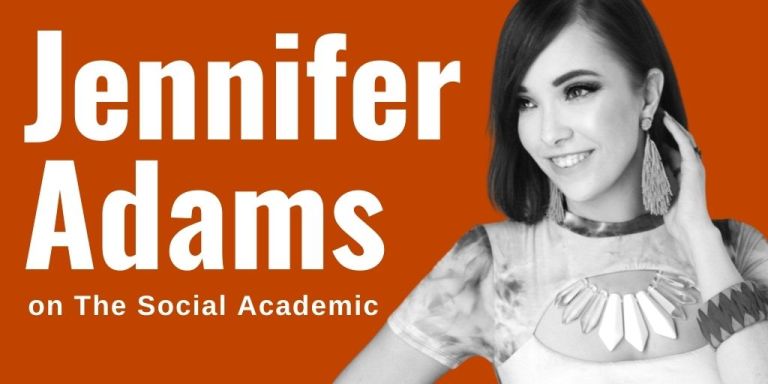
What is a social media influencer? PhD student Jennifer Adams joins me to talk about her life as an Instagram influencer.
Juggling life as a full-time PhD student, therapist, and influencer is a lot of work. It’s a world Jennifer Adams (@RunwayRedLA) discovered when she moved to Los Angeles.
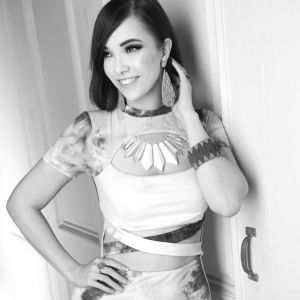
In this interview, we talk about
- How Jennifer got started on Instagram
- What it’s like to work with sponsors and brands
- Dealing with negative reactions (mean girls on Instagram)
- What her employers think about her influencer work
- How she thinks about what to write in Instagram posts
- Opening up and being personal with your audience on Instagram
- Dealing with imposter syndrome as a student
- Advice for you on how to get started on Instagram
I’m Jennifer van Alstyne. Welcome to The Social Academic blog. Here, I share articles and interviews about managing your online presence in academia.
There are a lot of misconceptions about what influencers do. It’s hard work! And, requires trust with your audience. I’m excited to share this feature interview with you.
Subscribe to The Social Academic blog.
The form above subscribes you to new posts published on The Social Academic blog.
Want emails from Jennifer about building your online presence? Subscribe to her email list.
Looking for the podcast? Subscribe on Spotify.
Prefer to watch videos? Subscribe on YouTube.
Meet Jennifer Adams
Subscribe to the interview series on Spotify | YouTube | TuneIn | ListenNotes | Blubrry
van Alstyne: Hi, everyone. I’m Jennifer van Alstyne. And today I am talking with PhD student, Jennifer Adams.
We are so excited to actually be having this conversation in person [on Zoom] that we’re getting to do this because we started talking about this a while ago. So I’m so excited she’s joining me here today.
Jennifer Adams is an Instagram influencer, a PhD student and a mental health therapist. So we’re going to talk about all of that today. Jennifer, would you mind just starting us off by introducing yourself?
Adams: Yes. Hi, everyone. My name is Jennifer Adams. I’m an Associate Marriage and Family Therapist here in California, depending on where you guys listening from.
I specialize in trauma healing. And what that means is I not only talk my clients through trauma or traumatic memories, but I also help them to physically and if it’s applicable, spiritually walk through letting go of that trauma.
I actually was originally a journalism major back in Florida. I just remember taking an intro to psychology class, fell in love with it. I mean, the study of why people do what they do, obviously, it interests all of us. We don’t even have to have a degree to understand that.
And then I also on the side, I do content creation for different brands, different clothing companies, that kind of thing. I run my own marketing agency now and I am a PhD student doing trauma and disaster relief work. So a lot of juggles in the air.
van Alstyne: That’s so much. That’s like so many different things at once. And I love that you recognized some of your strengths when you were an undergrad. But now that that’s turned into something that’s specialized and a focus, that also is something you will talk about on Instagram, that you’ll talk about on social media. And it’s really a part of who you are and the message that you share.
Adams: Definitely.
van Alstyne: That’s one of the reasons I was really interested in having you on the show today. As a PhD student who’s also doing this kind of influencer thing, and also starting your own business as a marketer all at the same time, that’s fascinating. So I can’t wait to dive in.
Adams: Right. A lot of students that I know are also entrepreneurs as well. And then of course, we’re struggling with our own mental health. Right now with COVID-19, we’re struggling with our own anxiety, depression, fear. We’re going into the holidays, that’s going to be really hard as well.
And then to not only manage that, I’m managing clients that are going through that, also a business that some parts did have to stop and some financial setbacks. But I think the most important part is like if you’re doing what you love, it’s going to give you that motivation to keep going or at least reach out for help. Especially as a student in times like this, which I definitely had to do even with my own university when COVID hit.
van Alstyne: It’s great to hear that you needed resources that maybe you would recommend to other people as well.
Sign up for my free training on how to manage your online presence.
Starting @RunwayRedLA on Instagram when Jennifer moved to L.A.

van Alstyne: Actually, I’d love to talk more about your Instagram and just kind of hear about how you got started.
Adams: Yeah. So it’s kind of funny, back in Florida, I heard nothing called influencer or content creator, I’d never heard of that.
And in Florida, I used to do a lot of modeling. So I would just post like just local modeling stuff, fashion shows, different things like that and just post little products that you buy yourself and you post it up on Instagram like this the best mascara I’ve found. Those little things when Instagram first launched.
And then I moved to California and it’s basically a very fast-paced lifestyle. A lot of people are on the internet networking and just different things and I heard the word influencer. And I’m like, “Aren’t you kind of like modeling with the product?”
But I guess that’s what everybody calls is an influencer. And in the beginning, I was just doing it for fun. And I knew that any platform that I had, especially with my mental health background, I wanted to bring a sort of empowerment and no comparison kind of thing. Like just saying, If I can succeed, you can succeed.
And I’ve always loved fashion and makeup. I grew up on thrift stores. My mom would always take me at thrift stores, I’m a hardcore thrifter. I can tell you all the great locations all around California.
I just was like, well wait, with me being a therapist, an Associate Therapist specializing in trauma, and we’re able to use these platforms to really talk about anything, and then I also love fashion and beauty…Why can’t I kind of blend those worlds?
Because makeup or clothes that we wear can really influence our mood and our mental health. I’ve struggled with anxiety and depression since 8th grade. And thankfully, I’ve had a lot of support system. God bless my therapist. And it’s kind of one of those things that there’s so many different avenues that can boost your mental health. And if I was using Instagram, I just wanted to empower others.
That’s kind of where it started. It took off and I was shocked.
But I think a lot of my followers just related to the fact that I’m a dork. I also like to read a lot and research and talk about common themes that people would talk about.
Just because I’m a therapist doesn’t mean I can’t talk about the latest Netflix show or anything like that.
And people related to it. It just took off and it’s now this beautiful community, where not only do I feel supported, but I can support others. And I’m just blown away by my followers and things that they’ve shared with me. They’ve asked out for resources sometimes and it’s been beautiful. It’s been beautiful. I’m very honored, honestly.
van Alstyne: So that’s the @RunwayRedLA account that you have. One of the things that I liked, I actually scrolled all the way back to the beginning of your account to prepare for this interview. I wanted to see-
Adams: You could see where I started to get a little better.
van Alstyne: I wanted to see how you started talking about yourself, especially. And one of the things that I loved was that you were very open about who you were. You were open about the work that you were doing in terms of your practice, but also in terms of yourself as a student. You would talk about books you were reading or some topic that you found interesting. And people really connected with that. People were engaging in the comments, people were really interested.
Subscribe to The Social Academic blog.
The form above subscribes you to new posts published on The Social Academic blog.
Want emails from Jennifer about building your online presence? Subscribe to her email list.
Looking for the podcast? Subscribe on Spotify.
Prefer to watch videos? Subscribe on YouTube.
Talking about mental health on Instagram
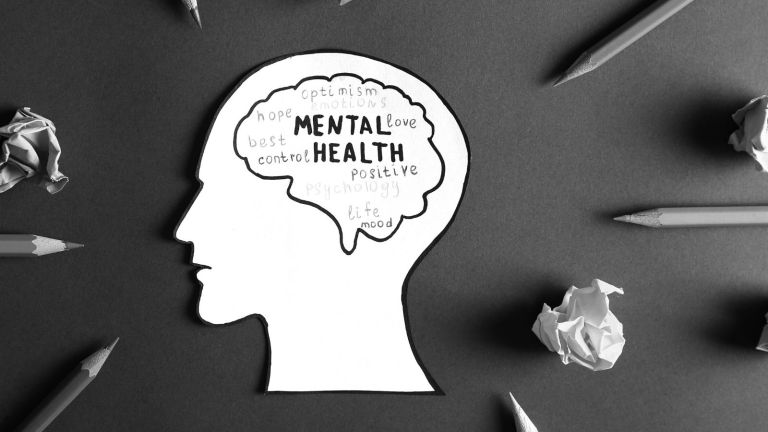
van Alstyne: So one of the things that you said in an interview was that you bring mental health into the fashion and beauty realm for various brands. I love that you combine all of those interests.
Adams: Yeah. When it comes to mental health, especially when I’ve either done marketing for brands or when I’ve just created the content for them, whether it’s gifted or paid, I’m very specific on which ones I say paid for, because you can get paid for anything honestly these days with promoting.
But I’m very careful because not only am I a therapist, I have to watch what I promote.
But also it comes down to do I believe in the product? I’m not one for selling out. And so when I wanted to kind of combine the kind of industries: the mental health, the therapy and the fashion and beauty…It’s just because I started talking to a lot of my friends who were influencers and I was getting inspired by them.
I was just like, well, we can talk about these things. Like yes, it’s awesome to post a picture of you looking pretty and you looking fire. But if you can add to someone’s life, I feel like that’s just such a powerful thing to do.
I started giving people tips on like boundaries and dealing with family. I’m going to do one on coping through the holidays, and people just started really relating to that.
So I just kind of curved my content to focus more on that. At first, it was just kind of posting product reviews, that kind of thing.
And then I just made sure to when I’m disclosing things like especially about my own mental health, that if a client were to find it, would I have an issue with it? Because you have to be very careful about what you disclose as a therapist.
I only disclose even in sessions with my clients, as long as it’s appropriate for them. I’m not going to be making the therapy about me. I have my own therapist for that. So if I can relate to them about anxiety and depression and say, “I’ve been depressed before. It’s really a struggle to get out of bed and shower and eat. But I hear that you are kind of not always forcing yourself, but you’re choosing to get out of bed. And that’s the strength right there.”
So I’m able to have that kind of empathy, that kind of understanding. And I just translate it to [social media] posts as well.
I’ve gone on there and talked about some really rough stuff before, like boundaries with family and intimacy is not just sex and divorce. And abuse is not just physical. So I’ve definitely just went on the platforms and talked about that.
When did you know you wanted to be an Instagram influencer?
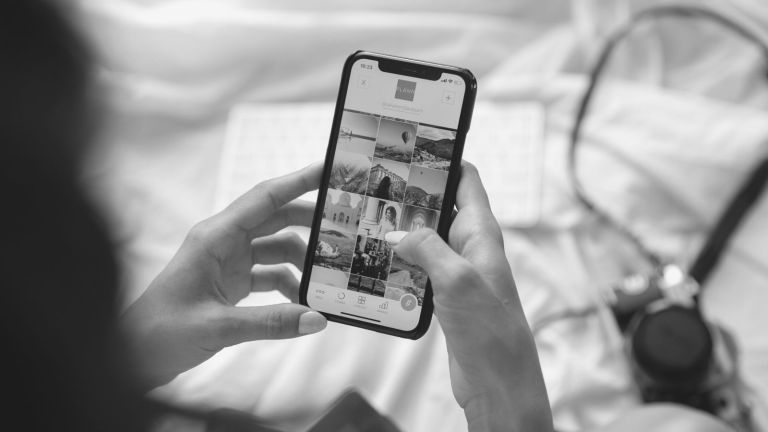
van Alstyne: That’s amazing. Can I ask you, you said that when you were in Florida, you hadn’t heard about influencers before, you didn’t know that maybe even people who did that existed. And then when you moved to California and kind of started doing that, you started posting reviews of products and reviews of different brands, honest opinions.
Did you have an idea at that point that you wanted to be an influencer, that this was something that was maybe a goal?
Adams: No. At that time, I just wanted to have fun with it. It wasn’t until probably 2 years in or so that I was starting to realize that people can get paid for promoting certain products that they actually believe in and they already buy.
And I was like, “Wait a minute, hold on.” So of course, and we all have bills to pay. But I mean, if I can get paid promoting a company like I did a call collaboration with CVS. Hello, when the pandemic hit, of course, we’re all getting our nail polish, hair care, makeup and stuff like that, and even just essential food from CVS. So I was like, “Well, why not?”
You apply, of course, the brand has to choose you, and then you have to agree to some of their Terms as far as like the paid collaboration. But I really didn’t make it a business until about 2-3 years in.
And now I’ve been doing it successfully for about…I want to say successfully, because this is when I actually started taking it seriously and understanding kind of the business mindset and kind of researching into that. I’d probably say I’ve been doing it for about 3 years now.
van Alstyne: Okay. So that’s more recent, where you say you’ve been doing it like intentionally and that you’ve been thinking more about the business side of things. Can I ask-
Adams: Yeah. Especially the content rotation of how your feed looks. There’s so many different factors. I even teach a workshop on this. So many different factors on how to connect with brands, what specifically say. You’re not just going to write a cold email and then expect them to say yes to you.
Instead, I’m someone that has sensitive skin. So if I’m speaking to a skincare brand that I’ve wanted to try, I’ll reach out to them and say, “I looked up your reviews. I have sensitive skin, so it’s really hard for me to find foundations. Do you have any samples that I can try or test out?”
And they’ll look at my account, of course, and they’ll be like, wow. And this was way before I had 20K, so this was like under 10K. They would be like, ‘Yes. We would love to and of course exchange for a review. Unless you’re unhappy, let us know.’
So that’s kind of where I started realizing and shifting my focus once I kind of matured and got a little bit more comfortable in California. You start to see like, wait, like you can actually make a business with this. And if I can make a business empowering people, sign me up.
Beauty influencer Jennifer Adams talks stigma around content creation
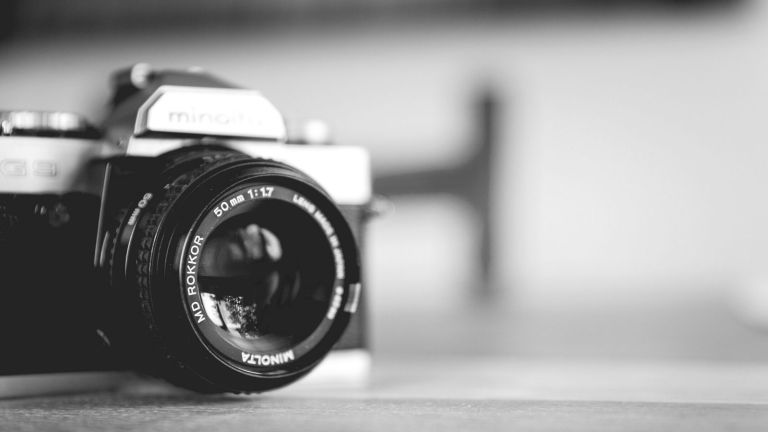
van Alstyne: Yeah, that sounds really interesting. I actually don’t know much about influencers. I’m not an influencer myself. I actually made an agreement with myself when I started my blog, like I’m might even going to take sponsorships for that, just because I do work with so many PhD students and professors who kind of have an icky feeling about it.
Adams: I get that.
van Alstyne: Yeah. So one of the reasons I wanted to have you on the show in particular is because you are an influencer in that beauty space and you also talk about mental health, you talk about your research, you talk about yourself as a person, as a PhD student. All of those things can be true at once.
I thought you’d be a great person to kind of tell your story about that because there is kind of a stigma around what being an influencer is and what that really entails. It sounds like it takes a lot of work. There’s a lot of steps to the process.
Adams: It does. It takes a lot of work and you also in the social media realm, I’ve been to PR events. I’ve met the influencers that are very famous, famous makeup artists, famous celebrities I’ve met.
And you have to definitely be careful because with anything, right? There’s some positives and there’s some negatives. And when it comes to social media, you definitely have to be careful because there’s a lot of comparison, people only show the highlight reel. So you’re only seeing some of the positive stuff half the time, usually most of the time.
So with social media, whenever I like talk with somebody or consult with them, it’s like, well, what is your purpose for social media? What are you wanting to do?
Some people want to do health and fitness, some people want to do you know exactly what I’m doing.
And in the beginning, I was scared, because there wasn’t an industry where therapists were online. I know there’s some therapists that are on YouTube, and they talk about mental health, and they do videos like that. But there was really no one on Instagram that I knew that was a therapist and also doing fashion and beauty.
So I took a big risk and I was very nervous. Because I didn’t know if my employers found out if they would be supportive, I don’t post anything risky. So I definitely make sure that. I don’t always have my full name on there, just because clients can go crazy.
But I’ve definitely now that I’ve been in the therapy business for so long, once you’re careful about everything that you share online, because it can be researched, even if you delete it, it’s still there. Kind of having that mindset has been really important in that.
And also, just making sure that I’m taking care of myself when I do social media and especially as a student. I’m not going to be on Instagram 20 hours a day. I work 8:30 to 5:00, Monday-Friday, that is my set schedule. The marketing agency stuff, I either do on my lunch break, or right after work, or on the weekends. My PhD homework, I do on the weekends except all of the articles during the week.
Subscribe to The Social Academic blog.
The form above subscribes you to new posts published on The Social Academic blog.
Want emails from Jennifer about building your online presence? Subscribe to her email list.
Looking for the podcast? Subscribe on Spotify.
Prefer to watch videos? Subscribe on YouTube.
Mean girls on Instagram, being told to ‘stay in your lane’
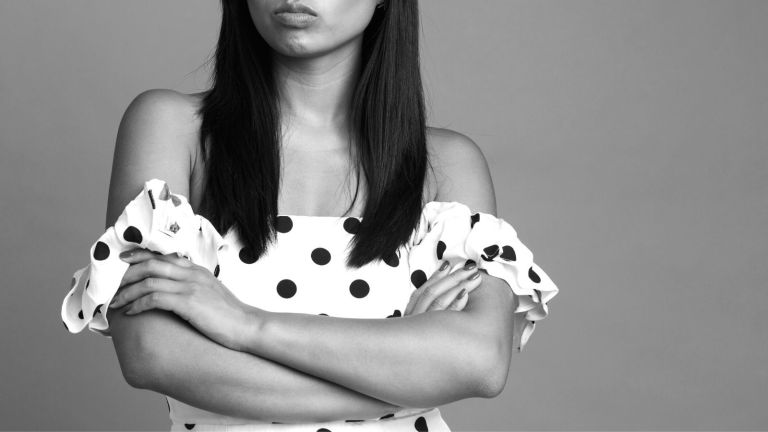
Adams: And I think when it comes to social media, you also have to be careful that you’re going to have haters.
You can be the nicest person in the world, and I’m nice to everyone I meet. But I have definitely learned especially even as a therapist and even before I was therapists, you can be the nicest person in the world and people can still hate you for no reason.
It usually doesn’t always have to do with you. They just don’t like something or maybe they’re jealous of something. And so being careful and knowing that people will attack you. If you have something successful, you’ll get attacked.
As my mom said one day, I had a couple girls attack me online, and they were like, “Well, you shouldn’t be an influencer. You’re a therapist. Stay in your lane.”
They got pissed because they had 50K, 100K and I had 10K [followers on Instagram] at the time, and they were just like, “You shouldn’t be here.”
And I’m like, “I’ve done nothing to you. Like, I don’t know you.” But because they were threatened by that, and a lot of them have public anxiety depression, different things, I think they were maybe worried I would go after the same brands or anything.
But they were already so successful. And I saw them as very successful businesswomen. But if you have a light to shine, people are going to attack you.
I remember calling my mom and I was crying. And I was like, “I don’t understand how people can be so mean.” Now I have a backbone, but I was calling my mom. And I was like, “I don’t get it. Like, I’m not doing anything against them. I’ve been nothing but kind to them. I’ve met them at events.”
And my mom was just like, “Jen, you’ve made it. You have haters and that’s it. Like, if you’re doing something right, you’re going to have people that are against it.”
I don’t like the term haters, just because I feel like that’s kind of like a comparison, like I’m better than someone else. But now with all of my training in psychology, I realize it has nothing to do with me.
And even if I meet these people, and I have continued to see them at PR events, I’m still kind. Because I have nothing against them. I’m still kind, I’m still going to treat you with respect, even if you hate my guts.
So that was the hardest lesson to learn about being an entrepreneur is that people will go after you. And that was hard. That was like one of the hardest lessons because I took that personal for quite some time.
van Alstyne: Yeah. Thanks for sharing that. I actually just wrote an article about dealing with negative reactions, specifically on Twitter.
One of the things that I found interesting about what you shared is that you did take it personally. It was something that affected you so much you felt like you needed to talk to your mom about it. It was something that-
Adams: I cried.
I was very upset for I think a week or two, I didn’t even post because I was just scared.
They had gone after my Instagram and shared it. They tried to block me from a group and pretend like they weren’t sharing my Instagram but you see those stories shoot up and you see. I had to go on a blocking frenzy, but it was hard.
van Alstyne: You have to do things to protect yourself.
Adams: Yeah. So that was one of the biggest lessons that I had to learn is people are just not going to like you. I definitely feel called in this branding, and just even as a therapist, I want to see people get released from past traumas and hurts, and I really have a big heart for that.
I want to open up a trauma center in the Valley of California, because we really need it. I just have a vision, I have a goal for it. And I definitely have realized, if you’re wanting to help people break chains, you’re going to have some opposition.
What does your employer think of you being a social media influencer?
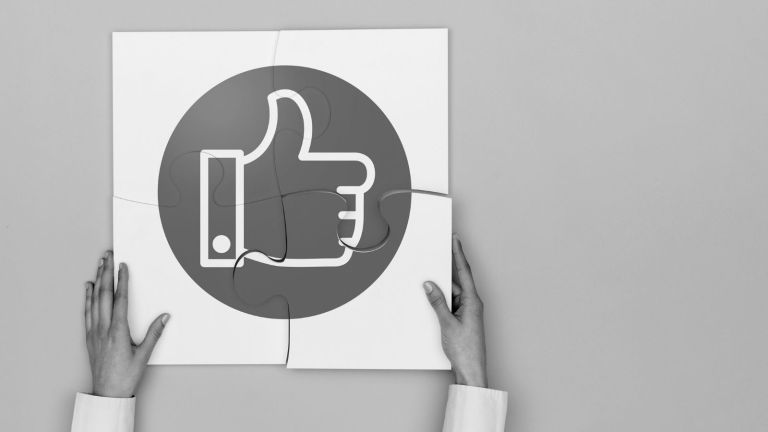
van Alstyne: Yeah, for sure.
What is your school or your employers know or maybe think about your Instagram? Is it something that you’ve shared with them? Or is it something that you just are cognizant of, and then think about what you share?
Adams: Yeah. When it comes to my school, my school is online. So it’s North Central University and I’m doing my PhD there. So a lot of it is like online self-instructed.
The only time I’ve had to kind of tell them what’s kind of going on in my life, personally, is when I had to kind of sign up for the disabilities with my mental health. And then I was recovering from cyst at the time. So I was like showing them proof of being in the hospital, please don’t kick me out of the class. This is what’s going on.
And I shared with them that I do social media, but it’s kind of like an online school. So it wasn’t like that much.
When I was in grad school, people picked up on it was like, they would look at my phone and be like, oh, my God, that’s you. Because I don’t wear makeup a lot unless I have to see people or something like that. I’m not a super girly girl.
van Alstyne: You don’t walk around saying like, “I’m an Instagram influencer.”
Adams: No [launghing]. No, “Honey, you need to respect me.” God, I’ve met those.
But no, I kind of don’t usually tell people, even my friends at first, like if I’m meeting new friends, I usually don’t tell them until a little later, because I’ve definitely gotten the reaction of like, “Holy shit, you have how many followers?” That kind of thing.
And I’m like, “Yeah.” But I don’t make it like a big deal. It’s just like, yes, I’ve built a community, but the numbers don’t matter if you’re being a jerk.
And then as far as my employers were concerned, my current ones, at first, I wasn’t sure how they’d feel because again, I’m doing therapy. So I have to be very careful what I put online.
So at first, I wasn’t sure if they were supportive. I kind of downplayed it.
And then when I got published in L.A. STYLE Magazine for 100 Women In Power, I brought a copy of it to work. My boss read it, and I didn’t even think if she was supportive or not, but her boss read it and cried.
They started asking me, they were like, “What are you doing online?” Then they started getting like you’re doing all of this.
So because of that, actually, they started finding out that I’m good at marketing, and just good at writing and connecting with people that at work, they put me on a trauma informed committee.
And then a diversity and inclusivity committee to make sure we’re doing changes and things that are appropriate to include people of color. And make sure like pamphlets, how people come into our centers, and then the trauma informed just pretty self-explanatory because I love trauma.
But I didn’t think I’d get recognized and then all of a sudden people talk. Now they’re supportive. So it was kind of weird at first.
van Alstyne: Yeah. It sounds like the story and sharing your story actually helped them connect with you and understand what your strengths and skills were, so that they knew a better way to help you be more involved with your work. I think that’s great to hear that it actually helped you in a way.
Adams: Not everyone at work is supportive over it and I’ve definitely got made fun of, but I don’t know what to say.
I bring the free stuff to the office. And if you don’t want it, you don’t want it. But again, workplace dynamics, sometimes you have people that hate you, like you, whatever.
But most of the time, they’ve been like supportive. So it’s kind of been like off and on support, non-support.
van Alstyne: I think that’s kind of life. I feel like that’s how we are with everyone who interacts with us. Like people like some parts of us and maybe some others not so much. I found that-
Adams: The stigma is there too because…This is why I kind of started hesitating. At first, I was really excited to like talk about it. But the reason why I started kind of hesitating to mention content creating, like I stopped kind of using the word influencer sometimes, although now I kind of interchange it with influencer and content creator.
Because some of the first reactions with people, because now everyone’s an influencer, they tend to think that I’ll think I’m better than them. And I don’t. I definitely I’m not a perfect person. No matter how many years of therapy I learn, do, whatever, I’m never going to understand what it’s like to be in someone’s shoes. I can’t speak to that.
When it comes to social media, I just don’t think I’m better than anyone else even if I had 100K or 50K [followers]. What’s beautiful that I love is that we create a community and my friends have found other friends that are just really sweet and supportive to them online.
But other than that, that’s sometimes why I hold back because people just make assumptions that I’m stuck up or whatever.
But then when they like meet me, and then they conversate with me, they’re like, “Oh, my God.”
And I’m like, “Yeah, if you want like free skincare, I have too much. Come get it.”
And then they’re like, “Seriously?”
I’m like, “I’m seriously. Like dead serious.”
So then they kind of understand it, but then some people are just quick to judge. So it’s got pluses and benefits. Yeah.
van Alstyne: So it sounds like you’ve done content creation, you’ve done influencer work for some time. You’ve done it more professionally for about 3 years. Now you started your own marketing business. Is that right?
Adams: Yeah. Just recently, actually, last year. Just end of last year, I started it.
van Alstyne: Congratulations. That’s so exciting.
Adams: Thank you.
How @RunwayRedLA decides what to write on Instagram
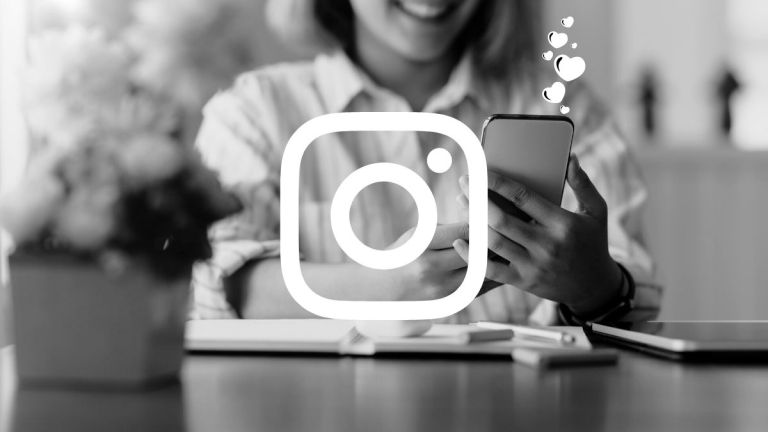
van Alstyne: I also like that you have a separate Instagram for that marketing business, and that you are maybe a little bit more personal there, like you share longer posts there that would really help people connect with the story you’re sharing, who you are, and what you really bring to the table. Can I ask, how do you start writing those Instagram posts? What is the process for writing a post about yourself?
Adams: On my own Instagram or the marketing on?
van Alstyne: Any of them. I think it’s similar. When you’re writing a post about yourself, they tend to be a little bit longer, they tend to be a little detailed. So I’m curious, how do you go about that?
Adams: Yeah. So with my marketing agency, definitely, I wanted to make that separate, just because if I’m giving that to potential clients and stuff like that, like, yes, they could see my own personal Instagram and how it has 20 whatever followers, 20K followers. But then like the marketing, it kind of shows like I’m kind of creating a feed to start giving tips and like different things, but not give away all my secrets. But just kind of like mindset is key, that was one of the posts I did for my marketing agency and understanding someone’s purpose if you’re working for a brand.
But then when it comes to my individual Instagram, the @RunwayRedLA, I just kind of think about what’s going on in the world at the time. Especially, for instance, COVID-19, I definitely wrote a post about how because we’re not able to go outside, I definitely experienced sleeping issues or a little bit of a little bit of depression coming up again.
And needing to connect with my therapist, and make sure I’m seeing her every two weeks, and not being afraid to ask for help. I talk about that a lot. And if you don’t like therapy, there’s online support groups, if you don’t like online support groups, there’s books. I mean, there’s so many choices now that we have.
So I think a lot about what’s going on the world. I also pull a lot from either like my own life experiences.
For instance, I was in a marriage that ended up being abusive, and he turned to alcohol, unfortunately. Not a horrible person, but just someone that has their own demons to face. Unfortunately, he chose not to face them, and I had to get a divorce and a restraining order to get him out.
So I did a lot of research on narcissism, I did a lot of research on psychological abuse. So because I’m learning this information, and then I’m talking with some of the people that are on Instagram, I was like, you know what, I need to post this. So I definitely talked about how abuse is not okay.
And so I kind of relate it to something like if I’m going to write a caption, I need to be able to like kind of speak life into it or just kind of offer either tips, or a personal kind of thing of not giving away too much personal stuff, but also being upfront and saying like, abuse is not okay, no matter what it is. And just being blunt, honestly, and saying like it’s not okay. Whatever kind it is. And you can’t love someone enough to absolve their addiction. I just kind of get straightforward. I’m like, “You can’t do that.”
And then I jump on stories and kind of go a little bit more in depth. And people just responded. They’ve shared, “I left a marriage that was abusive. He wasn’t physical either,” blah, blah, blah. So they’ll relate a lot to that.
So those are usually where I pull from. Or if I’m reading something on research for my PhD, I actually, I didn’t know if anybody would respond to this.
But I ended up posting a certain research that I would find, and I would be using it for my PhD assignments. And I would just post. Like, I would turn my camera around and just post a story saying, “I’m finding this article about spirit possession and trauma related symptoms. If you want the link to it, if you’re curious, let me know.”
And people would actually respond and say, “Here’s my email, I would love to read it.” And it’s not just therapists that are commenting my stuff. There are some therapists that follow me. But it would just be normal people.
It was great because they were like, “I really like this because you’re finding interesting articles about trauma. And you can just email it to me, and it’s free.” And I would talk about books that I’m reading, different things like that. So I pull a lot of inspiration from that.
And from music sometimes, too. Because sometimes when you hear a song, you’re either like, that’s so good. Or you’re like, yeah, that’s power. So sometimes I’ll pull quotes from there and make sure I cite them and stuff. So I don’t need anyone coming after me.
Connecting with her followers on Instagram has been about opening up
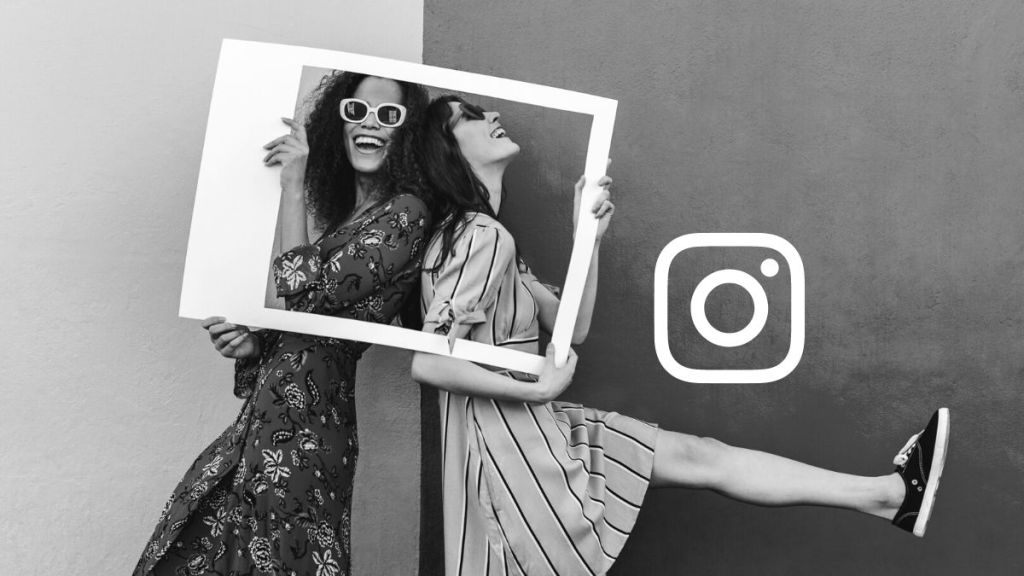
van Alstyne: What do you enjoy most about Instagram? What is it that you really enjoy that keeps you coming back, that keeps you wanting to spend time there?
Adams: My followers. I’m just consistently blown away by them.
When I was going through my divorce, I was kind of sharing how hard it was. I actually went on Instagram once, I was scared to do it, but I went on Instagram just kind of feeling like I hadn’t heard God’s voice for a while and was being very honest about it, and how it was like tough and getting judgment from the church saying you weren’t praying enough and all this other stuff. And I was just like, there’s a lot of guilt and shame for the women that get out of these abusive relationships, and I was just talking about it.
And then I went to the gym one time, heard a sermon online when I was working out, and I just got on my Instagram after. And I was like, “This message was really powerful for me.” And I was actually like crying and just stating what I had heard. Oh, my god, I got like 15 to 20 messages the next day just being like, thank you for being vulnerable and sharing.
And then fast forward to now, the connections with people all over the world is incredible. Like, I literally feel like they’re my friends. Because you end up supporting each other back and forth and that’s been beautiful. That’s why I keep coming back.
Because it’s like you want to support your close friends, like the people that you actually know in person. But then there’s so many other people that continue to support you, and you just become friends. That’s been beautiful.
And some of the messages that I’ve gotten when I’ve gone through hard stuff have really, really helped me through tough times. And it’s like one thing if your mother or your brother, your boyfriend reaches out, but it’s another when a complete stranger just sees some of the highlights and also sees you being vulnerable on [social media] stories, writes your message. And you’re just like, “I didn’t even know I had that much impact.”
van Alstyne: And that people care so much that they’re taking time not only to listen to your message, but to respond to it in a way that shows that they care and that they want to connect. That’s really beautiful.
Adams: Yeah. I just think the power of the internet…I grew up with AOL dial-up. Anybody remembers that?
van Alstyne: Yeah.
Adams: I do not think about those days much. But I remember like AOL dial-up and internet coming around, nowadays all these 5-year-olds can just push and play with everything. It’s amazing. But also kind of bad.
But that’s what’s so interesting about the power of the internet, you can connect with people all over the world. And then talking about mental health, you’re able to also like even for me as a therapist, obviously, I don’t give therapy and I put the disclaimers like, I’m not your therapist, that kind of thing. I’m not giving you medical advice. And I can’t give you therapy, if I’m your friend. I can’t give you therapy.
I’ve had to explain that to a couple friends, and it’s one of those things, but I can give you resources. I can help you find a therapist in your area. I can teach you how to look on PsychologyToday.com, typing your zip code. I can send you a couple profiles based on what you’ve shown me.
I get that stuff can be overwhelming. So I’ve actually helped a couple friends find their own therapist. And I think that’s one of the benefits. Like you can use your platform for good or for evil in that sense.
van Alstyne: Yeah. And also the things that you’re talking about right now, the things that people were connecting with you over and that you were able to help them on, they’re all things that wouldn’t have happened if you had just had a traditional beauty influencer account.
Because you have this extra message, because you are a trauma person yourself, because you’re doing the research and you’re in practice on the ground, it makes a big difference for how much people can really relate to that. So I love that.
Adams: It does. It’s been amazing too because when I first started getting invited at PR events, obviously right now they’re not happening in person, I was definitely nervous because these girls dress up to the nines, and they have their makeup like immaculate and their hair all immaculate, and their extensions and their Gucci everything. And you’re just like, “I got like an $8 thrift store dress on.”
Subscribe to The Social Academic blog.
The form above subscribes you to new posts published on The Social Academic blog.
Want emails from Jennifer about building your online presence? Subscribe to her email list.
Looking for the podcast? Subscribe on Spotify.
Prefer to watch videos? Subscribe on YouTube.
PR and influencer events can be overwhelming to some
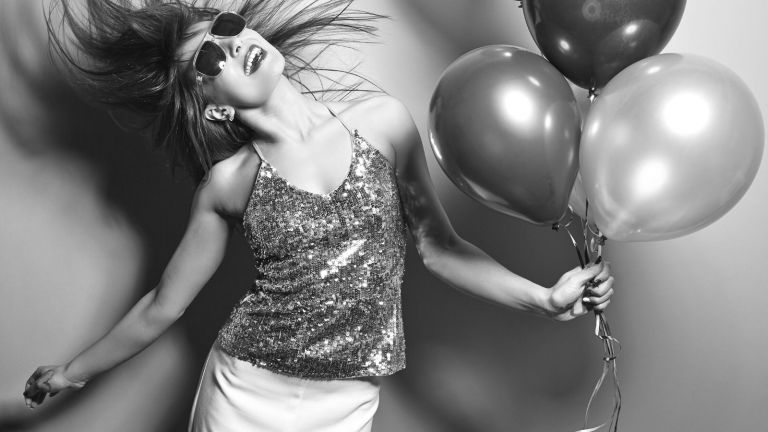
van Alstyne: I saw your [Instagram] boomerang from the Macallan Manor and I was like, “That looks so amazing.”
Adams: Oh, my God. I mean, I trip out when I get invited to certain high-end events. I tripped out with that. And I was like, “Oh, my god, the Greystone Mansion.” Beautiful experience and beautiful event.
And it’s just so great because when you do go to these events, I’m kind of seeing it from different perspective. Because when I go to these events, I notice the girls that are socially awkward or the ones that have to show up and have to kind of put on this very brave face. I get it. And I’m going there from kind of a perspective of like, yes, I understand what the brand’s wanting. But also, I’m looking at it from a therapeutic standpoint.
There’s a lot of people that go to these events that have super social anxiety. I’ve met girls where they’re alone, and all I do is I don’t care. I’m like not they’re trying to get a million samples or anything. I’m like, I get free gifts. I’m like, “Yay.” But I don’t always expect it.
And so when I go to these events, and if I’m alone, or say I see another girl alone at the event, then I’m actually going to say hi. And because I’ve done that, I’ve actually gotten really close girlfriends of mine, because we’ll both be by like the snack table. And I’m just like, “Hi, your dress is pretty.” Like, be a real human. And you meet such beautiful people. So it’s kind of been interesting in that way.
One event Paris Hilton was in and everybody was swarming to get a photo with her. And I just thought in my head, I was like, I’m not going to go. And my friends were like, “Oh, my God. Oh, my God. Go get a picture of her. This is so great.”
And I was like, “But guys, everyone’s swarming to her.” I don’t know about you, but I would be like…
van Alstyne: It would be overwhelming for me.
Adams: I know that she does that all the time and I’ve seen her documentary and I know she’s been through. I just saw her recent documentary, and if you haven’t watched it, it’s-
van Alstyne: I haven’t watched it yet.
Adams: The Paris Hilton documentary, it’s free on YouTube (1h 45m). She’s been through some trauma. I kind of picked up on that a little bit.
I didn’t say hi to her at the event. I let her do her thing. She’s an having event. So yes, be in appearance. And I know, she’s all over social media and she knows that a rock her stuff.
And then it was funny because I didn’t like approach her. I didn’t swarm to her. I didn’t do anything. And she actually like randomly smiled at me and waved hi. And I was just like, “Hi.” Just normal person. I was like, “Hi.”
van Alstyne: Sometimes even that connection, sometimes that like moment of recognition of each other and just recognition of each other as individuals can be more meaningful.
Adams: And there were hundreds of people in that room. I mean, the room was packed by the time she had already gotten there. And so when she walked in, it was like, people were packed back-to-back-to-back. So it’s very impressive. I think more than anything, if your purpose, say you’re talented at one thing or multiple things, I’d say go for it.
Even when I was kind of attacked for my social media, and that I should stay in my lane and just be a therapist, I was like, “Yeah. But if a client came to me and said that they were talented baking and they were talented it like science, why can’t you go for both of them?” Like, if it’s not harming someone and it’s not harming yourself, hopefully not going broke or anything like that, why not?
So that’s what I tried to tell people like even on social media, they’ll see my platform and they’ll be like, “Oh, my God, you’re so successful.”
And I’m like, “Yeah, but this is years in the making, and I’m still learning and I’m not perfect. I’m still learning different functions.” I don’t even know how to do TikTok. I mean, one day I’ll learn. But it’s kind of like, take what you’re passionate about and go for it.
Dealing with imposter syndrome as a student
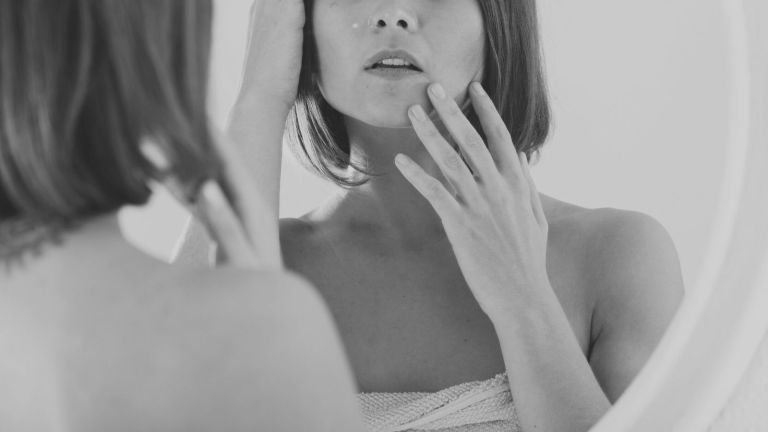
Adams: And then when you have bombs, because you’re going to have struggles, I’ve had countless struggles, I was actually kicked out of university because I got a low GPA due to depression. I fought it.
I tried to say like, here’s proof, I’m in therapy, I was on antidepressants at the time. But because of the low GPA that kind of fell over several semesters, they kicked me out. And I was halfway done with my bachelor’s. And I remember thinking, oh, my God, I want to continue and I can’t. I remember crying and feeling so depressed, and I was like already depressed, so that adds a whole nother layer when you get kicked out. Home life wasn’t very safe and different things were happening. And I’m just like, “What am I going to do?”
And then I started researching schools. I actually found Saint Leo University, called them up, explain to them what happened. And they were like, “Well, when you transfer, your GPA starts over, and we looked and your credits transfer.” And I was like, “Oh, my God, are you serious?” Because I had literally below a 2.0 GPA. I did.
I was able to get into that program, thankfully, and all my credits transferred, which was just a miracle. I ended up finishing my bachelor’s degree. And then after the bachelor’s, I had done good with those classes, went into the masters.
I’m someone that my first week of college, which was what, August of 2005, I remember going to my first week of college classes at a community college and seeing people around me, smarter than me, they just got the material. I’m not good at math and science, but I’m great at reading, writing, marketing, that kind of thing people. And I remember feeling so stupid. I remember like crying and my mom picked me up at the time because I didn’t have a car at the time.
My mom picked me up in a car and I remember bawling my eyes out and being like, “I’m too stupid to go to school. I’m too stupid.” I remember my mom a little emotional.
She’s like my biggest supporter. But I remember my mom just like encouraging me and being like, “You can do it. You’re not stupid.” And that really helped because not a lot of people have supportive parents nowadays. And sometimes you just need one person.
Nowadays we make a joke of it being like, yeah. My mom goes, “Yeah, you remember that week that you cried and you told me you were so stupid and blah, blah, blah?” She’s like, “And now you’re going to for your PhD.”
So I don’t mind disclosing that kind of stuff, because how would that be harmful to someone else to say, “Yes, you have setbacks in life and depression and anxiety. Whatever your diagnosis is, you can have setbacks. But if I can do certain things, why can’t you? I’m no better or at a higher level than you. Just because I have a master’s degree does not mean I’m higher than you. So what can we do in your life to get you where you want to go?” These aren’t people that are just my clients, but it’s like, why not? Why can’t you do that? Who’s telling you that?
So sometimes I’m able to be a little bit more to the point and trusting of people who are not my clients to be like, if these are friends, I’m like, “Hey, who told you that you can’t do this?” And like, “Who’s telling you these things?” If it’s yourself, maybe you need some personal growth and some healing there. If it’s other people, are they the ones doing the classes for you? You’re the ones sitting in those classes. You’re the one doing that assignment.
So you have to decide what you want and if it’s going to help. I went to community college. If community college isn’t for you, I tell people go to trade schools. There’s so many opportunities to get certificates. it just depends on what you want to do.
And thankfully, we’re now in a generation that you can do a lot of things and have access to it now. I’ve also done a lot of research on people of color. They don’t have a lot of the access, that me as a white person does get. And so I’ve definitely had to even do research on my own privilege, and how I can be an ally, and an anti-racist and all of that kind of stuff. So you definitely have to learn and grow and see what to be done.
Advice for graduate students joining Instagram from a social media influencer
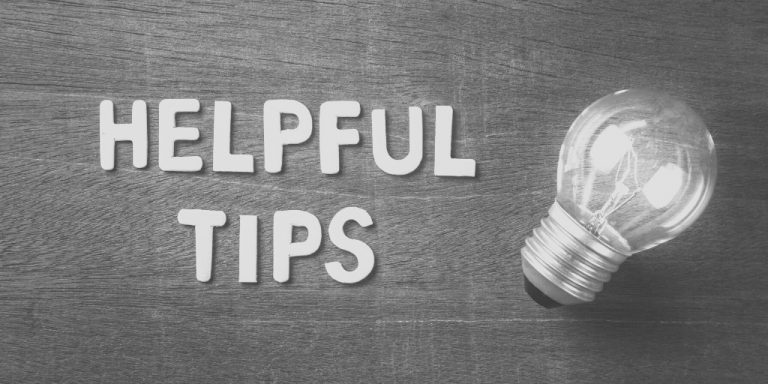
van Alstyne: Thanks for sharing that.
You just had some amazing advice about education and about moving forward. Even when we have setbacks and trauma, just keep going. Because if that’s you, if it’s something that you want, if it’s something that you have a goal for, there are things that you can do to move forward. I really like that advice.
But I’m going to ask you for some specific advice about Instagram. There are so many grad students and PhD students out there who would like to be on Instagram, maybe they’ve never done it before and they’re thinking about starting now. What advice do you have for them about getting started on Instagram?
Adams: So I would definitely say kind of think about what you want to use your Instagram for. Is it going to be like friends and family and you just want to post pictures that make you happy? Go for it. You don’t need to make your feed look all pretty. Just go for it. Have fun on it. Don’t think about it. Like connect with family and friends, that kind of thing.
If you want to make it a business, or say you’re a student and you want to share writing tips, or whatever, I would say definitely download like apps like UNUM. You can see kind of like I use it literally daily to see what your feed looks like. And it is free. I use the free version because the paid one you can schedule out your post. But I kind of don’t mind. I don’t need to schedule them just right now. So I use it to see like what my feed looks like.
If you’re like brand new to Instagram, and you’re like, what in the world is Instagram? Well, it’s a platform now that you can post pictures, videos, and reels, which reels can be like either videos or something you cut-up.
The reels, I’m not super talented. I posted one to try it and I was like, eeh. That was just me. But I can do [Instagram] lives and post those and that kind of thing.
But hashtags are a really big thing on Instagram, especially if you’re starting out and you have a smaller account. The reason why I say smaller account is because once you hit over 10K on Instagram, your engagement goes down because Instagram only shows your account to 3% of your followers.
A lot of people think that that’s fake. And I have seen countless of my friends hit 10K, when I hit 10K. And then I’ve seen my friends that have 50K, 100K, they’re having 50K, and they’re getting less than 3,000 likes. I know these friends. So I did ask them, “Did you buy your followers? I won’t tell.” And a lot of them were like, “No, I didn’t buy my followers. And then as soon as I hit this platform, boom.” And it’s because Instagram knows you’re making money. And Instagram isn’t always getting a cut of the piece.
So it depends on how many people engage with you. It’s all this kind of like, they call it the Instagram algorithm because depending on how people engage with you, that’s how Instagram’s going to boost your post.
Social media platforms use algorithms to decide what to share with whom. Algorithms determine what shows up in your home feed and in what order. Using machine learning, these algorithms process a data about what you interact with and what you most like to see most.
So that’s a big thing to learn if you’re starting off is like, don’t take it personal if you don’t get a lot of traction at first, you got to have to like build your way there.
If you all go down my page, you can see when my feed started looking a little bit more professional. But you can see. You can even see some of my engagement. I used to get almost 1,000 likes. So I don’t mind saying that.
But more than anything, start off with like the basics. Post what you want that makes you happy, because you’re going to want to come back to kind of a platform that makes you happy.
And then learn like different apps and stuff like that that worked for you, which I believe Canva, UNUM looks really great. Trying to think what other apps that I use a lot. Trying to think-
van Alstyne: Those two are great.
Adams: Those are the two that I use most frequently.
van Alstyne: Awesome.
Adams: And I researched a lot from other people. So I would definitely do that.
Pick a topic and go for it. Some people have asked me if I have two different topics, can I mix them? And I was like, “Yeah, why not?” Like if you’re doing fitness and-
van Alstyne: You’re like, “I do.”
Adams: Yeah, why not? And people have asked me like, “Why didn’t you make a separate Instagram, one for your brand, one for your therapy?” And I said, “Well, right now I’m not in private practice. I work in community mental health.” When I’m in private practice, I will have to create a new one for private practice, because it’ll have to be specific to the brand and all that kind of stuff. So in the future, I might do that, because I’ve seen my therapist do the same thing, and she has a very successful business. So I kind of have learned bits and pieces.
Another thing is, if you’re starting off on Instagram, there is a lot of classes that you can take that are really affordable. There’s also a lot of free classes that people offer of just like tips and tricks go on Instagram. Google is also your friend.
Pinterest also has a lot of good ideas of how to get started on Instagram. So just doing some little research and more than anything, experiment on Instagram.
When you have a lower follower count on Instagram, Instagram doesn’t punish you for deleting photos.
Now, once you get over a certain percentage, which is usually 10K and up, it does kind of push down your next post, because it’s kind of like punishing you for deleting. So I’ve had to like archive photos before of people who shall not be named. That ends up happening. So yeah, I would say those would be the best places to start.
van Alstyne: Thank you for sharing those apps.
Also, that being on Instagram should be something that you enjoy. So like write about what you enjoy, think about what you enjoy, because then you’ll keep doing it. And also just like experimenting, being okay with something maybe not working so well the first time, that’s totally okay. Great advice.
Here’s a rundown of Instagram tips from @RunwayRedLA
- You don’t need a pretty feed, it’s OK to just connect with family and friends
- Apps like UNUM and Canva can help you get the look you want on Instagram
- Hashtags are great on Instagram
- Once you reach 10k followers, it’s harder to reach your audience
- It’s OK to talk about multiple topics
- Consider courses to learn more, and find Instagram tips on Pinterest
Subscribe to The Social Academic blog.
The form above subscribes you to new posts published on The Social Academic blog.
Want emails from Jennifer about building your online presence? Subscribe to her email list.
Looking for the podcast? Subscribe on Spotify.
Prefer to watch videos? Subscribe on YouTube.
Connect with Jennifer Adams on Instagram
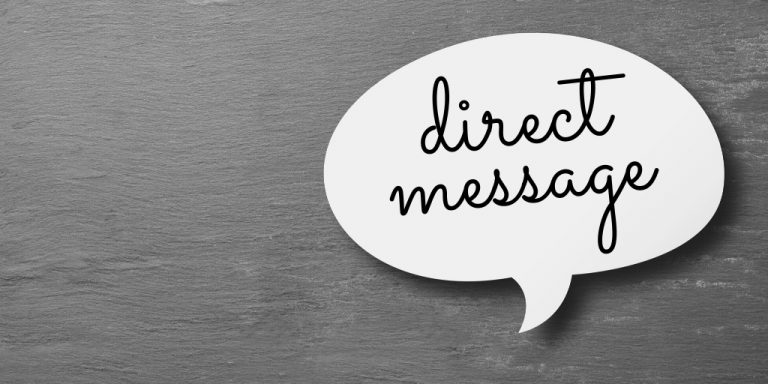
van Alstyne: Thank you so much for joining me for this interview, Jennifer. Is there anything else that you’d like to share before we wrap up?
Adams: No. If you guys want to find me or if you ever need any research or book nerding out, I also love Doctor Who, so if you’re a Doctor Who fan or The Office, DM me. DM me all the memes and things. We’ll chat.
But other than that, you can just find me on @RunwayRedLA on Instagram, and then @JAdamsMarketing on Instagram and starting to create like websites and stuff. But other than that, I’m on there.
van Alstyne: All right. Thank you so much for joining me, Jennifer.
Adams: Thank you so much.
van Alstyne: Thanks so much for joining me for this feature interview. Next month, I’m bringing you a new article on what to do when you feel like social media is consuming your life. And the last interview of 2020 will feature former NASA intern, Aaron Shepard. Be sure to subscribe to The Social Academic today and connect with me on social media @higheredpr.
Thanks for joining me
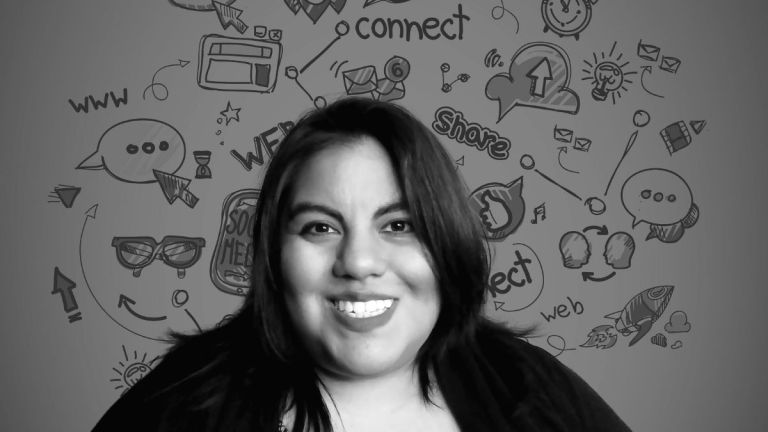
Next month, I’m bringing you a new article on what to do when you feel like social media is consuming your life. And, the last interview of the year will feature former NASA intern Aaron Shephard.
Subscribe to The Social Academic so you don’t miss it.
Bio for Jennifer Adams
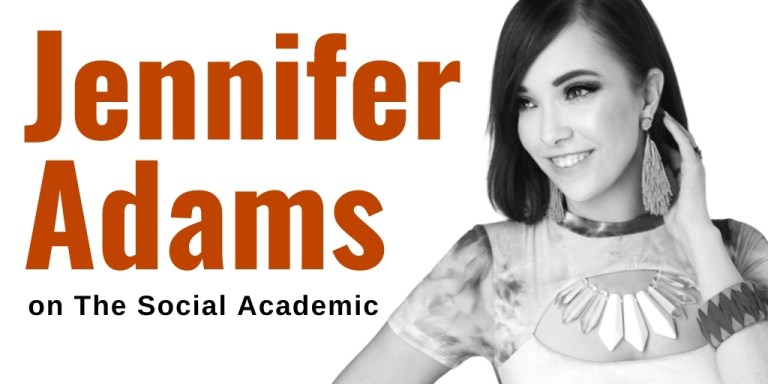
Jennifer Adams is an Associate Marriage & Family Therapist (#110390) who specializes in trauma healing. She’s also earning her PhD in trauma and disaster relief. Jennifer’s experience of healing her own childhood trauma sparked her desire to help others be free.
When she’s not supporting individuals with their mental health and wellness, she creates content for her own brand @RunwayRedLA and is a Marketing Agency Director @JAdamsMarketing.
Jennifer van Alstyne View All →
Jennifer van Alstyne is a Peruvian-American poet and communications consultant. She founded The Academic Designer LLC to help professors build a strong online presence for their research, teaching, and leadership. Jennifer’s goal is to help people feel confident sharing their work with the world.
Jennifer’s personal website
https://jennifervanalstyne
The Academic Designer LLC
https://theacademicdesigner.com
